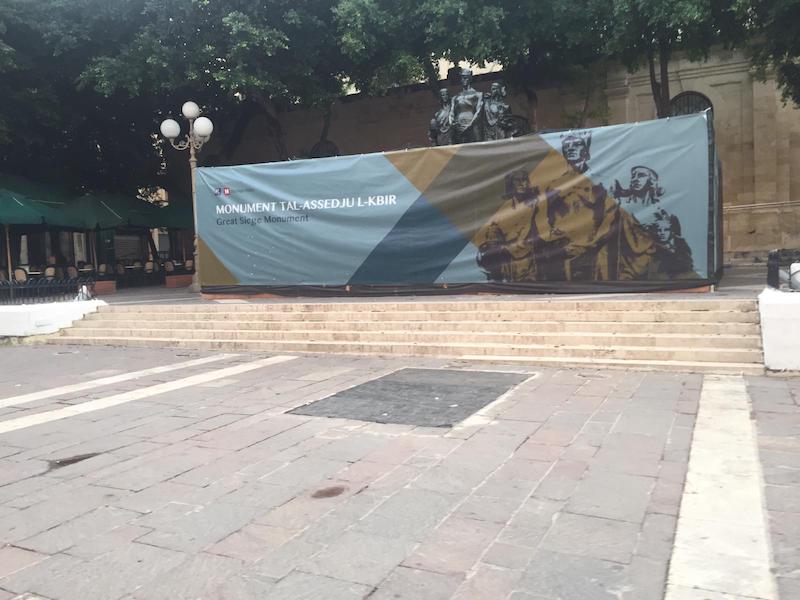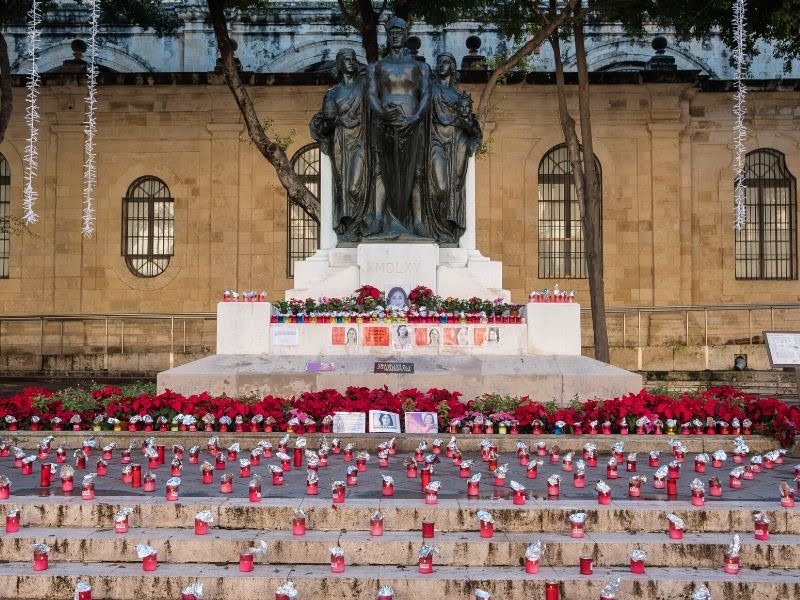The order handed down by former Justice Minister Owen Bonnici for the removal of candles, messages and flowers at Daphne Caruana Galizia’s protest memorial in Valletta breached the fundamental right to freedom of expression, with the “thought and specific intention” to hinder all those who wanted to protest and keep alive the call for justice, a court said.
In a strongly-worded judgment, Judge Joseph Zammit Mckeon said the constant clearing of the items was nothing but a “pique”. He described it as a “systematic method” of hindrance that should have never taken place.
The judge took a decision on a constitutional cased filed by blogger and activist Manuel Delia after government employees were tasked with removing the items left at the Great Siege memorial in September 2018. At that time, the memorial had been hoarded up, with the authorities saying that it needed restoration.

A barricade was erected to prevent public access to the Daphne Caruana Galizia protest memorial in September 2018.
Speaking at a press conference earlier today, Delia welcomed the judgment and called for the resignation of Bonnici, who is now Education Minister, saying his position was untenable. “If we just stop with the judgment, we will be abandoning the clear need for political responsibility,” he said.
Even if Bonnici did not step down, Prime Minister Robert Abela had a duty to ensure that fundamental human rights were protected and that the educational system was not administrated by someone who repeatedly and consciously, in a “pique” and “absurd” way breached these rights, Delia said.
The judge said he was not “serenely” convinced that the restoration of the monument was ordered because of any damage caused by the items. He pointed out that it was “absurd that those who issued the order thought the protesters had any interest in letting the monument fall into a mess”.
The judge described the situation as “surreal” where each time items were placed at the memorial as a form of protest, these were cleared from the area. He also threw out the argument made by government authorities that the candles and flowers were removed because they constituted “rubbish”.
“The court excludes that these items, left at the time and, which are still being left today qualify as rubbish,” it said.
The judgment went on to say: “If the aim was to keep alive the protest, would Delia and the others place objects such as candles and flowers without replacing these?” Who would go to the site of a protest memorial if there were burnt out candles and dead flowers?
The nightly destruction of the memorial to #DaphneCaruanaGalizia was always one of the most cruel & arbitrary examples of distain to her memory & #FreeExpression in Malta. Today's ruling rightly ruled this breached human rights https://t.co/eIeOew2cjj @Manwel_Delia @TheShiftNews
— Scottish PEN (@ScottishPEN) January 30, 2020
The news comes two days after eggs and red liquid were thrown at the candles and photos. International NGO Article 19 and civil rights group Occupy Justice expressed their satisfaction at the outcome of the judgment.
#Malta: Breaking – Important victory for freedom of expression & the right to protest as Constitutional Court finds former justice minister @OwenBonnici violated protesters rights by ordering daily destruction of memorial calling for justice for #DaphneCaruanaGalizia. https://t.co/dpwQQoomfr
— ARTICLE 19 Europe & Central Asia (@article19europe) January 30, 2020
“This is for you, Owen Bonnici. You trampled on our rights for more than a year. You should hang your head in shame and hand in your resignation,” Occupy Justice said on Facebook.
The court noted that the authorities did not give an explanation as to why the items were suddenly being removed so frequently from the Great Siege memorial. Also, prior to September 2018, government employees were instructed not to touch anything left at the site until Bonnici gave a direct order for these to be removed. “The items were removed on Bonnici’s orders and not because these were rubbish.”
Questions were also raised about Bonnici’s order for the monument to be restored. “It is hard for the court to accept that the decision to restore (the monument) had been taken a while back”.
The court said it was not at all convinced about the government’s argument that the monument needed restoration 11 months after Caruana Galizia’s death when no one, including those responsible, had complained about any damage.
He also said he was “worried” about the way the decision was taken. “This court is not morally serene and convinced that the restoration was ordered because it had been damaged by the protest items. If this were the case, these would not have been allowed to be placed there for 11 months.”
The choice of the protest memorial was relevant because of its position in front of the law courts where justice was served. Delia and other protesters were calling for justice for the death of Caruana Galizia.
The authorities used “an excuse” to justify clearing the items, the court ruled. “The monument is what it is: it honours the Maltese people. And it should always be this way. Any person who uses it for any other reason, should not be given shelter,” Judge Zammit Mckeon said while highlighting that this was relevant to the government and not Delia.
Thanks to the government’s behaviour, the monument became a “instrument of division” and it should have never been the case.
It also issued a set of recommendations to the protesters to show a sense of care, responsibility, respect and sensitivity towards the monument and surrounding area by avoiding sticking any items on the bronze statues or the white pedestal, or leaving items such as flowers or candles on the white marble, among other things.
The court said it understood “Delia’s (and the protesters’) actions, which want to keep the call for justice alive”.












